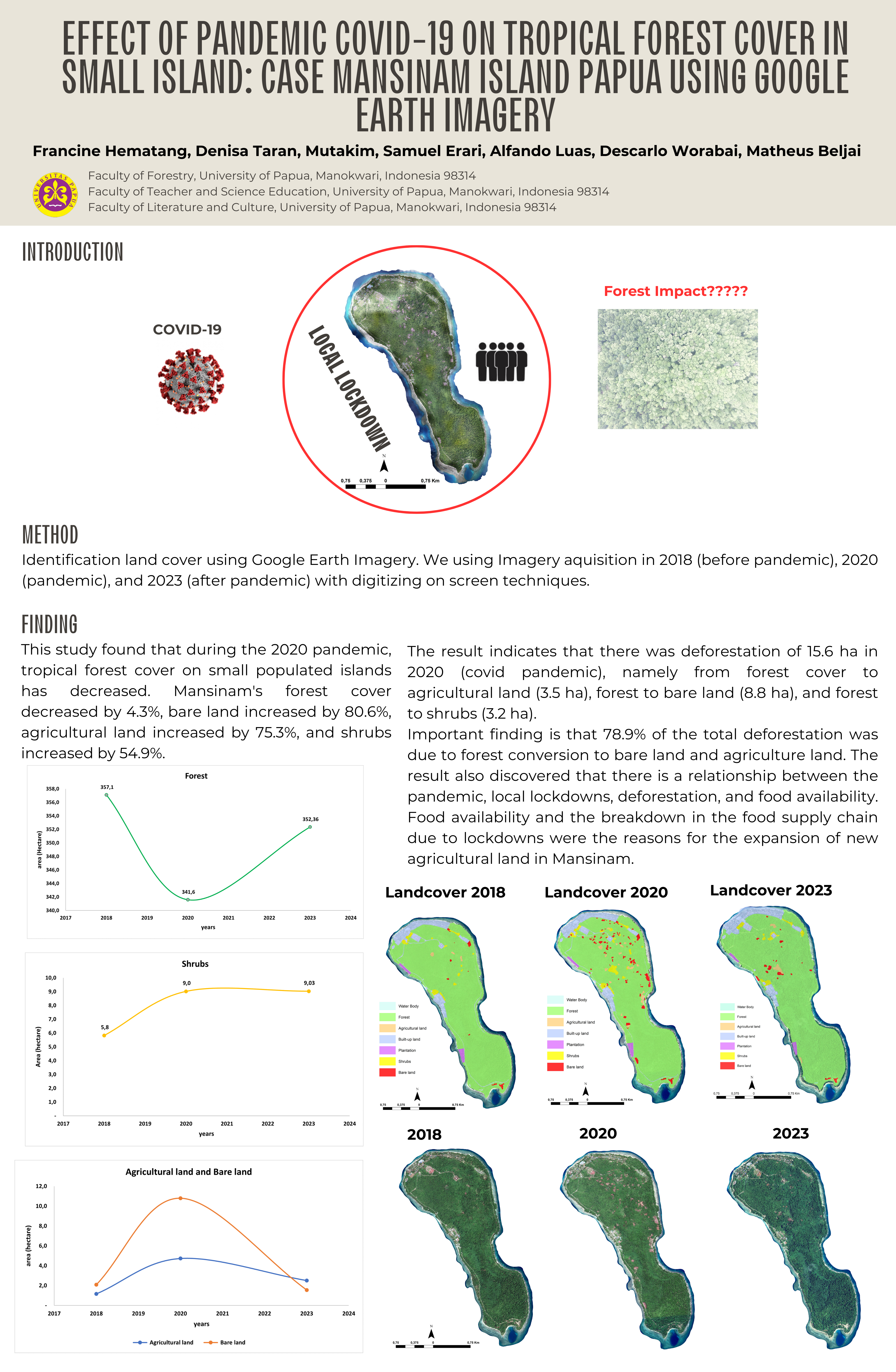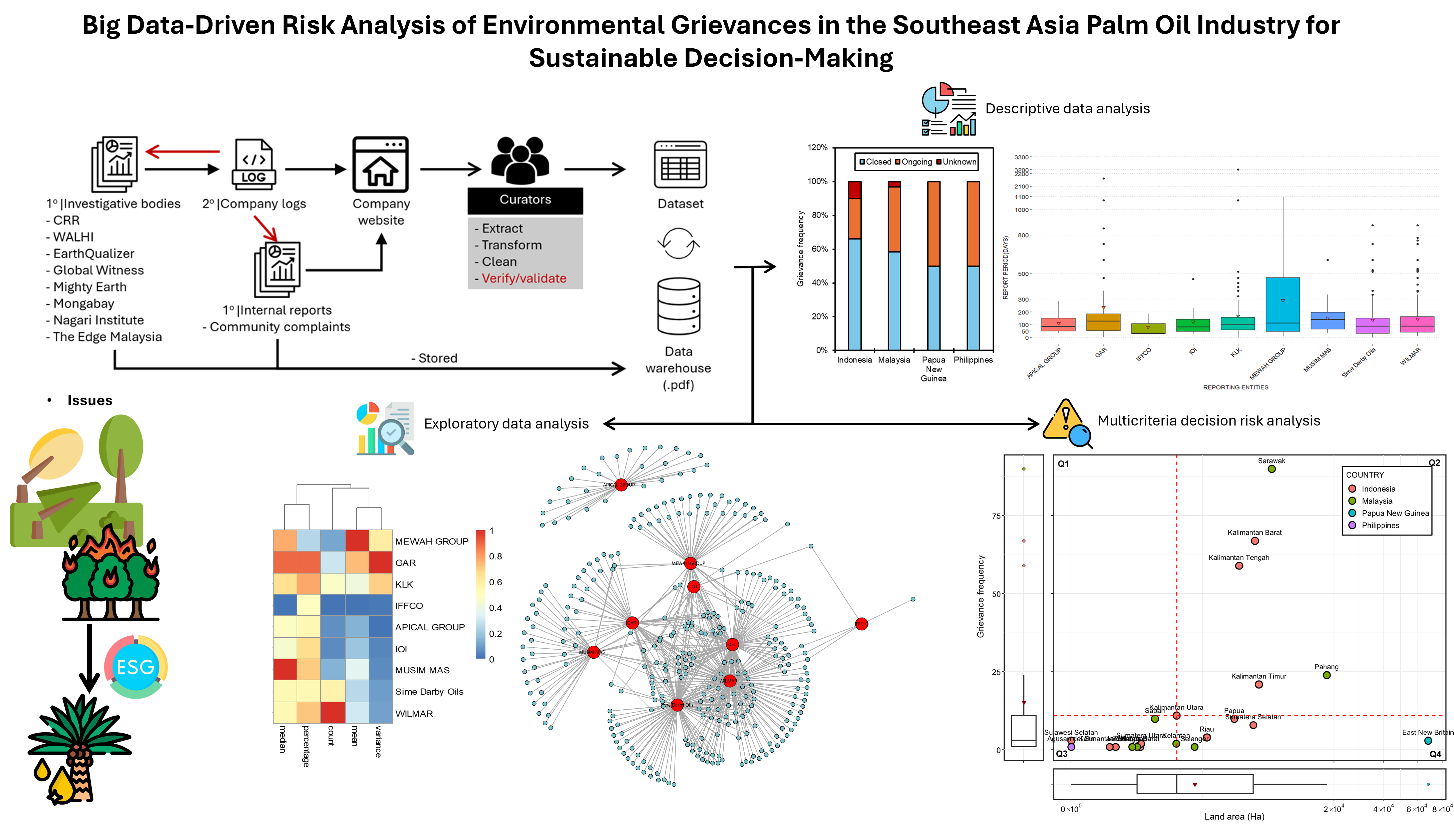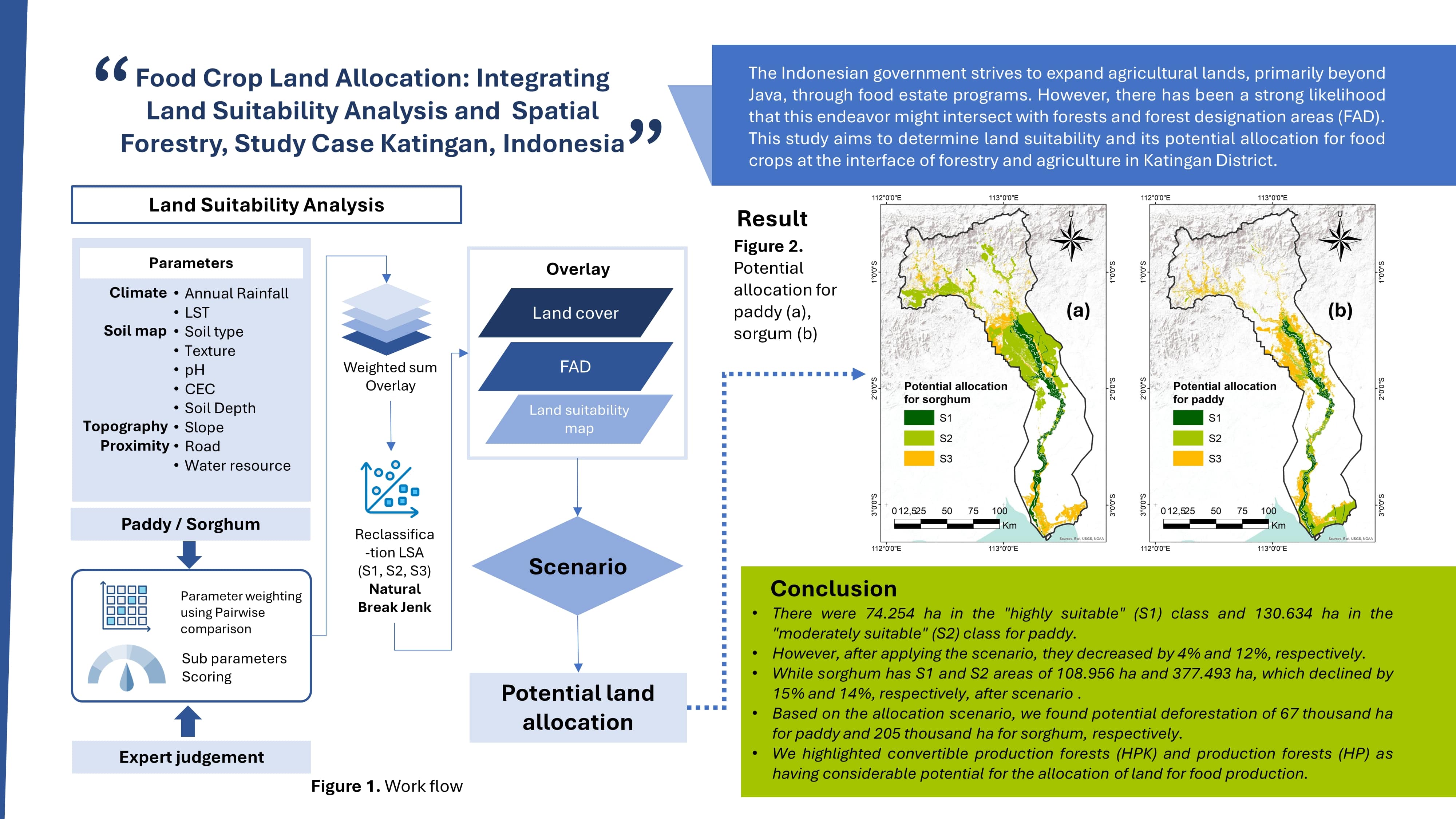Collaborative Governance Effort to Manage Forest in Kalimantan Island: Literature Review
Abstract
Deforestation has given many problems to all the survival of living things throughout the world. Becoming one of the main issues in Kalimantan Island, there is a need for deforestation prevention and land restoration that must be carried out by all stakeholders including government, private sector, and the local community. Collaborative governance is expected to be a solution to deforestation in Kalimantan. The purpose of this research is to map out several collaborative governance efforts in forest management with local communities in Kalimantan. This research uses systematic literature review (SLR) approach on finding relevant articles for answering the formulated problems. The results of this study are the discovery of two main points in forest management efforts through collaborative governance with local communities: 1) collaboration between village communities (community forest) and state forest companies, called collaborative forest management programs (CFMP) and 2) social learning.
References
Andriyana, W., & Hogl, K. (2019). Decentralization drivers beyond legal provisions: The case of collaborative forest management in Java Island. Forests, 10(685), 1–23.
Angarita-baéz, J. A., Pérez-miñana, E., Vargas, J. E. B., Agudelo, A. R., Ortiz, A. P., Palacios, E., …, & Vargas, J. E. B. (2017). Assessing and mapping cultural ecosystem services at community level in the Colombian Amazon. International Journal of Biodiversity Science, Ecosystem Services & Management, 13(1), 280–296. https://doi.org/10.1080/21513732.2017.1345981
Ansell, C., & Gash, A. (2008). Collaborative governance in theory and practice. Journal of Public Administration Research and Theory, 18(4), 543–571. https://doi.org/10.1093/jopart/mum032
Ansell, C., & Gash, A. (2017). Collaborative platforms as a governance strategy. Journal of Public Administration Research and Theory, 28(1), 16–32. https://doi.org/10.1093/jopart/mux030
Assuah, A., Sinclair, A. J., & Reed, M. G. (2016). Action on sustainable forest management through community forestry: The case of the Wetzin’kwa Community Forest Corporation. The Forestry Chronicle, 92(2), 232–244.
Barbanti, O. (2015). Economic cycles, deforestation and social impacts in the Brazilian Amazon. Agrarian South: Journal of Political Economy, 4(2), 169–196. https://doi.org/10.1177/2277976015597121
Bhatta, L. D., Eric, B., Oort, H. Van, Stork, N. E., & Baral, H. (2015). Ecosystem services and livelihoods in a changing climate: Understanding local adaptations in the Upper Koshi, Nepal. International Journal of Biodiversity Science, Ecosystem Services & Management, 11(2), 145–155. https://doi.org/10.1080/21513732.2015.1027793
Boafo, Y. A., Saito, O., Kato, S., Kamiyama, C., Takeuchi, K., & Nakahara, M. (2015). The role of traditional ecological knowledge in ecosystem services management: The case of four rural communities in Northern Ghana. International Journal of Biodiversity Science, Ecosystem Services & Management, 1–16. https://doi.org/10.1080/21513732.2015.1124454
Böhling, K. (2019). Land use policy collaborative governance in the making: Implementation of a new forest management regime in an old-growth conflict region of British Columbia, Canada. Land Use Policy, 86, 43–53. https://doi.org/10.1016/j.landusepol.2019.04.019
Boubacar, I. (2012). Neighboring effects of deforestation: A spatial econometric approach. Environmental Economics, 3(3), 1–11.
Burnham, J. F. (2006). Scopus database: A review. Biomed Digit Libr, 3(1). https://doi.org/10.1186/1742-5581-3-1
Camacho, L. D., Gevaña, D. T., Carandang, A. P., & Camacho, S. C. (2015). Indigenous knowledge and practices for the sustainable management of Ifugao forests in Cordillera, Philippines. International Journal of Biodiversity Science, Ecosystem Services & Management, 1–10. https://doi.org/10.1080/21513732.2015.1124453
[CIFOR] Center for International Forestry Research. (2012). The context of REDD+ in Indonesia: Drivers, agents and institutions [Working paper 92]. Bogor.
Darmadi, H. (2017). Dayak and their daily life. Journal of Education, Teaching and Learning, 2(1), 42–46.
Ekawati, S., Budiningsih, K., Sari, G. K., & Muttaqin, M. Z. (2019). Forest policy and economics policies affecting the implementation of REDD+ in Indonesia (Cases in Papua, Riau and Central Kalimantan). Forest Policy and Economics, 108, 1–15. https://doi.org/10.1016/j.forpol.2019.05.025
Emerson, K., Nabatchi, T., & Balogh, S. (2011). An integrative framework for collaborative governance. Journal of Public Administration Research and Theory, 22(1), 1–29. https://doi.org/10.1093/jopart/mur011
Eynon, R. (2014). How to review a journal article: questions of quality, contribution, and appeal. Learning, Media and Technology, 39(2), 151–153. https://doi.org/10.1080/17439884.2014.888354
Fajarwati, N., & Masruri, M. S. (2019). Role of local wisdom community Dayak Kanayatn in the fire disaster prevention (forest fires for the opening of farming fields in West Kalimantan). International Conference on Hazard Mitigation in Geographic and Education Perspectives (ICHMGEP), 1–9. https://doi.org/10.1088/1755-1315/271/1/012022
Fortier, J., Wyatt, S., Natcher, D. C., Peggy, M. A., & Hébert, M. (2013). An inventory of collaborative arrangements between Aboriginal peoples and the Canadian forest sector: Linking policies to diversification in forms of engagement. Journal of Environmental Management, 119, 47–55. https://doi.org/10.1016/j.jenvman.2013.01.005
[FWI] Forest Watch Indonesia. (2018a). Angka deforestasi sebagai “alarm” memburuknya hutan di Indonesia. Jakarta: Forest Watch Indonesia.
[FWI] Forest Watch Indonesia. (2018b). Deforestasi tanpa henti “Potret deforestasi di Sumatera Utara, Kalimantan Timur dan Maluku Utara. Bogor: Forest Watch Indonesia.
Gurung, A., Bista, R., Karki, R., Shrestha, S., Uprety, D., & Oh, S.-E. (2012). Community-based forest management and its role in improving forest conditions in Nepal. Small-scale Forestry, 1–12. https://doi.org/10.1007/s11842-012-9217-z
Hall, T., Beecham, S., Bowes, D., Gray, D., & Counsell, S. (2012). A systematic literature review on fault prediction performance in software engineering. IEEE Transactions on Software Engineering, 38(6), 1276–1304.
Hamdani, H., Kurniawan, Y., & Yuliono, A. (2016). Turning back rice farming on Dayak Meratus Tribe in South Kalimantan – Indonesia: An environmental and economic assessment. International Journal of Research in Agriculture and Forestry, 3, 38–45.
Harbi, J., Cao, Y., Erbaugh, J. T., Widagdo, F. R. A., Mauri, J., Supriyanto, & Milantara, N. (2020). Three generations of forest peoples’ empowerment in Indonesia: Process towards sustainable and equitable forest management. Jurnal Manajemen Hutan Tropika, 26(2), 91–104. https://doi.org/10.7226/jtfm.26.2.91
Hashiguchi, H., Pulhin, J. M., Dizon, J. T., & Camacho, L. D. (2016). Impacts of community-based forest management policies implemented by a local forest institution: A case study from Bayombong, Nueva Vizcaya, Philippines. Small-scale Forestry, 1–21. https://doi.org/10.1007/s11842-016-9324-3
Jacqmain, H., Bélanger, L., Courtois, R., Dussault, C., Beckley, T. M., Pelletier, M., & Gull, S. W. (2012). Aboriginal forestry: Development of a socioecologically relevant moose habitat management process using local Cree and scientific knowledge in Eeyou Istchee. Canadian Journal Forestry Research, 42, 631–641. https://doi.org/10.1139/X2012-020
[KLHK] Kementerian Lingkungan Hidup dan Kehutanan. (2018). Pemetaan tematik kehutanan Indonesia. Jakarta: Ministry of Environment and Forestry.
Korhonen-Kurki, K., Sehring, J., Brockhaus, M., & Gregorio, M. Di. (2014). Enabling factors for establishing REDD+ in a context of weak governance. Climate Policy, 14(2), 167–186. https://doi.org/10.1080/14693062.2014.852022
Lestari, N. (2019). Factors causing failure of the REDD+ program implementation in Central Kalimantan Methods. Jurnal Manajemen Hutan Tropika, 25(1), 28–34. https://doi.org/10.7226/jtfm.25.1.28.
Lubis, M. S., Harjoko, T. Y., & Susanto, D. (2018). The floating houses of Sintang City: Space, resources and political nexus. Quality in Research: International Symposium on Materials, Metallurgy, and Chemical Engineering 24–27 July 2017, 1–8. https://doi.org/10.1088/1757-899X/316/1/012003
Luttrell, C., Resosudarmo, I. A. P., Muharrom, E., Brockhaus, M., & Seymour, F. (2014). The political context of REDD+ in Indonesia: Constituencies for change. Environmental Science and Policy, 35, 67–75. https://doi.org/10.1016/j.envsci.2012.10.001
Maier, C., & Abrams, J. B. (2018). Navigating social forestry – A street-level perspective on national forest management in the US Pacific Northwest. Land Use Policy, 70, 432–441. https://doi.org/10.1016/j.landusepol.2017.11.031
McDougall, C., & Banjade, M. R. (2015). Social capital, conflict, and adaptive collaborative governance: exploring the dialectic. Ecology and Society, 20(1), 1–24. https://doi.org/10.5751/ES-07071-200144
Mcdougall, C., Jiggins, J., Pandit, B. H., Rana, S. K. T. M., & Leeuwis, C. (2013). Does adaptive collaborative forest governance affect poverty? Participatory action research in Nepal’s community forests. Society & Natural Resources: An International Journal, 26(11), 1235–1251. https://doi.org/10.1080/08941920.2013.779344
Mengist, W., Soromessa, T., & Legese, G. (2019). Method for conducting systematic literature review and meta-analysis for environmental science research. MethodsX, 7, 1–21. https://doi.org/10.1016/j.mex.2019.100777
Meyer, C., & Miller, D. (2015). Zero deforestation zones: The case for linking deforestation-free supply chain initiatives and jurisdictional REDD+. Journal of Sustainable Forestry, 1–37. https://doi.org/10.1080/10549811.2015.1036886
[MoEF] Ministry of Environment and Forestry. (2016). National forest reference emission level for deforestation and forest degradation: In the context of Decision 1/CP.16 para 70 UNFCCC (Encourages developing country Parties to contribute to mitigation actions in the forest sector). Jakarta: MoEF.
[MoEF] Ministry of Environment and Forestry. (2018). The state of Indonesia’s forests 2018. Jakarta: Ministry of Environment and Forestry.
Mulyani, M., & Jepson, P. (2013). REDD+ and forest governance in Indonesia: A multistakeholder study of perceived challenges and opportunities. Journal of Environment & Development, 22(3), 261–283. https://doi.org/10.1177/1070496513494203
Nkemnyi, M. F., Herdt, T. De, Chuyong, G. B., & Vanwing, T. (2016). Reconstituting the role of indigenous structures in protected forest management in Cameroon. Forest Policy and Economics, 67, 45–51. https://doi.org/10.1016/j.forpol.2016.03.012
Parkins, J. R., Dunn, M., Reed, M. G., & Sinclair, A. J. (2016). Forest governance as neoliberal strategy: A comparative case study of the model forest program in Canada. Journal of Rural Studies, 45, 270–278. https://doi.org/10.1016/j.jrurstud.2016.04.006
Pautasso, M. (2013). Ten simple rules for writing a literature review. PLoS Computational Biology, 9(7), 1–5. https://doi.org/10.1371/journal.pcbi.1003149
Pinkerton, E. (2019). Benefits of collaboration between indigenous and non-indigenous communities through community forests in British Columbia. Canadian Journal Forestry Research, 394, 387–394.
Prevedello, J. A., WinckID, G. R., Weber, M. M., Nichols, E., & Sinervo, B. (2019). Impacts of forestation and deforestation on local temperature across the globe. PLoS ONE, 14(3), 1–18.
Rakatama, A., & Pandit, R. (2020). Reviewing social forestry schemes in Indonesia: Opportunities and challenges. Forest Policy and Economics, 111(1), 1–13. https://doi.org/10.1016/j.forpol.2019.102052
Savilaakso, S., Cerutti, P. O., Zumaeta, J. G. M., Mendoula, E. E., Tsanga, R., Savilaakso, S., …, & Zumaeta, J. G. M. (2017). Timber certification as a catalyst for change in forest governance in Cameroon, Indonesia, and Peru. International Journal of Biodiversity Science, Ecosystem Services & Management, 13(1), 116–133. https://doi.org/10.1080/21513732.2016.1269134
Schultz, C. A., Mclntyre, K. B., Cyphers, L., Kooistra, C., Ellison, A., & Moseley, C. (2018). Policy design to support forest restoration: The value of focused investment and collaboration. Forests, 9(512), 1–20. https://doi.org/10.3390/f9090512
Setiajiati, F., Karyaatmadja, B., Sutedja, I., Kuswondho, H., Satria, P., Sejati, & Maharani, R. S. (2019). Lesson learned from social forestry practice in a forest and climate change project in Kalimantan, Indonesia. IOP Conference Series: Earth and Environmental Science, 363(1), 1–8. https://doi.org/10.1088/1755-1315/363/1/012001
Snyder, H. (2019). Literature review as a research methodology: An overview and guidelines. Journal of Business Research, 104, 333–339. https://doi.org/10.1016/j.jbusres.2019.07.039
Takahashi, A., Kumagai, T., Kanamori, H., Fujinami, H., Hiyama, T., & Hara, M. (2017). Impact of tropical deforestation and forest degradation on precipitation over Borneo Island. Journal of Hydrometeorology, 18, 2907–2922. https://doi.org/10.1175/JHM-D-17-0008.1
Uluk, A., Sudana, M., & Wollenberg, E. (2001). Ketergantungan masyarakat Dayak terhadap hutan di sekitar Taman Nasional Kayan Mentarang (CIFOR, ed.). Bogor: SMK Grafika Desa Putera Indonesia.
Wagner, K. C., & Byrd, G. D. (2004). Evaluating the effectiveness of clinical medical librarian programs: a systematic review of the literature. Journal of the Medical Library Association, 9(1), 14–33.
Wardani, E. M. (2014). Perubahan iklim dan suku bangsa minoritas di Filipina: Pengalaman dan pelajaran dari Suku Bangsa Ifugao untuk masyarakat Asia Pasifik. Jurnal Kajian Wilayah, 5(2), 111–132.
Wegscheider, S., Purwanto, J., Margono, B. A., Nugroho, S., Buchholz, G., & Sugardiman, R. A. (2018). Current achievements to reduce deforestation in Kalimantan. Indonesian Journal of Geography, 50(2), 109–120.
Wodjojo, S., Darmawan, M., Poniman, A., Maulida, N., & Sutanto, A. (2013). Detection of forest degradation using MODIS imagery in east Kalimantan, Indonesia. 34th Asian Conference on Remote Sensing 2013, 4, 3190–3196.
Wolff, N. H., Masuda, Y. J., Meijaard, E., Wells, J. A., & Game, E. T. (2018). Impacts of tropical deforestation on local temperature and human well- being perceptions. Global Environmental Change, 52, 181–189. https://doi.org/10.1016/j.gloenvcha.2018.07.004
Wyatt, S., Hébert, M., Fortier, J., Blanchet, É., & Lewis, N. (2019). Strategic approaches to Indigenous engagement in natural resource management : use of collaboration and conflict to expand negotiating space by three Indigenous nations in Quebec, Canada. Canadian Journal Forestry Research, 49, 375–386. https://doi.org/10.1139/cjfr-2018-0253
Authors

This work is licensed under a Creative Commons Attribution 4.0 International License.
Jurnal Manajemen Hutan Tropika is an open access journal which means that all contents is freely available without charge to the user or his/her institution. Users are allowed to read, download, copy, distribute, print, search, or link to the full texts of the articles in this journal without asking prior permission from the publisher or the author. This is in accordance with the Budapest Open Access Initiative (BOAI) definition of open access.








